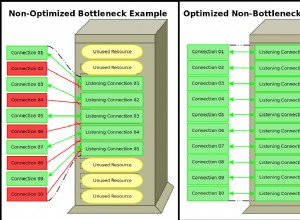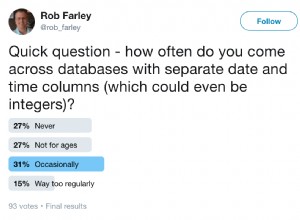Quanto segue dovrebbe funzionare, se i valori sono effettivamente NULL e non vuoti:
select id,
concat_ws('||', Phone1, Phone2, Phone3)
from t
Il riferimento è qui :
Per gestire l'ordine, sceglierei:
select id,
group_concat(phone Separator '||' order by phone) as ConcatPhones
from (select t.id,
(case when nums.n = 1 then phone1
when nums.n = 2 then phone2
when nums.n = 3 then phone3
end) as phone
from t cross join
(select 1 as n union all select 2 union all select 3) nums
) p
where phone is not null
group by id
Questo filtrerà qualsiasi ID che non ha un numero di telefono.
Puoi farlo anche con un case gigante dichiarazione, anche se sembra una specie di incubo:
select t.id,
(case when phone1 < phone2 and phone2 < phone3 then concat_ws('||', phone1, phone2, phone3)
when phone1 < phone3 and phone3 < phone2 then concat_ws('||', phone1, phone3, phone2)
. . . through the remaining 4 permuatiations when all three are present
when phone1 is null and phone2 < phone3 then concat_ws('||', phone2, phone3)
. . . through the remaining 5 permutuations when one is NULL
when phone1 is null and phone2 is null then phone3
. . . through the remaining 2 permutations when two are NULL
end) as ConcatPhones
from t
Questo è più efficiente. È possibile per 3 numeri di telefono. Non vorrei avere a che fare con, diciamo, cinque di loro.




